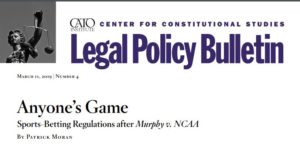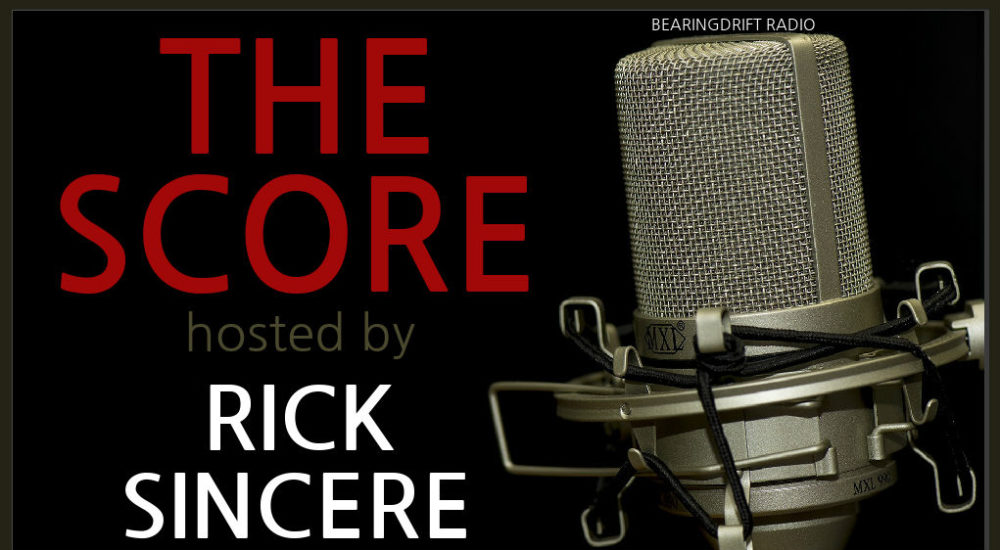The Score: Modern Intolerance, Ukrainian Elections, Sports Betting, Closing Borders
This week on The Score – Can a TV celebrity with no political experience be elected President (of Ukraine)? What will happen if President Trump closes the border with Mexico? As the NCAA hosts the Final Four, is legal sports betting in your future?
(((Semitism)))
 For the past three weeks, The Score has featured conversations with authors from the 2019 Virginia Festival of the Book. This week, we close out that series with an interview with journalist Jonathan Weisman, who has written a new book exploring the rise of anti-Semitism in 21st century America, called (((Semitism))): Being Jewish in America in the Age of Trump (the extra parentheses are there for a reason). There is a connection between anti-Semitism, specifically, and general intolerance toward “the other,” however that might be defined.
For the past three weeks, The Score has featured conversations with authors from the 2019 Virginia Festival of the Book. This week, we close out that series with an interview with journalist Jonathan Weisman, who has written a new book exploring the rise of anti-Semitism in 21st century America, called (((Semitism))): Being Jewish in America in the Age of Trump (the extra parentheses are there for a reason). There is a connection between anti-Semitism, specifically, and general intolerance toward “the other,” however that might be defined.
Weisman is deputy Washington editor for the New York Times and he can be found on Twitter as @jonathanweisman.
Ukraine Votes
 Last weekend in Ukraine, voters went to the polls to elect a new president. None of the candidates earned more than 50 percent of the votes, so there will be a runoff on April 21st. The leading candidate is an actor and comedian with no experience in politics or public service — but he plays the Ukrainian president on TV. Can he beat the incumbent? I asked John Dale Grover, assistant managing editor at The National Interest, to explain what’s happening in Ukraine.
Last weekend in Ukraine, voters went to the polls to elect a new president. None of the candidates earned more than 50 percent of the votes, so there will be a runoff on April 21st. The leading candidate is an actor and comedian with no experience in politics or public service — but he plays the Ukrainian president on TV. Can he beat the incumbent? I asked John Dale Grover, assistant managing editor at The National Interest, to explain what’s happening in Ukraine.
In an article published in The National Interest prior to the first round of voting, Nikolas K. Gvosdev offered a look at the lay of the land:
… we have a free-for-all with more than forty candidates, and a comedian, Volodomyr Zelensky, leading in pre-election polls. The same populist, anti-establishment anger that has propelled other inexperienced newcomers into office across Europe is playing out in Ukraine, where the promise of a revolution of dignity that fueled the 2014 Maidan revolution has not been realized during the tenure of incumbent President Petro Poroshenko. Reflecting concerns that Poroshenko needs to do more to signal his determination to change Ukraine’s traditions of corrupt oligarchical politics, U.S. ambassador Marie Yovanovitch has taken the unusual step of publicly calling on Poroshenko to dismiss Nazar Kholodnytskyy, the chief of the special anti-corruption office who has been accused of using his position to protect, rather than prosecute, Ukraine’s oligarchs. Yovanovitch has noted, “It is increasingly clear that Ukraine’s once-in-a-generation opportunity for change, for which such a high price was paid five years ago on the Maidan, has not yet resulted in the anti-corruption or rule of law reforms that Ukrainians expect or deserve.”
Washington has invested a good deal of support in Poroshenko’s government, including training and equipping the Ukrainian military, and does not want to see that investment frittered away. There is concern that Zelensky, despite his rhetoric and enthusiasm, would not be able to translate that into effective governance. And, as is par for the course in the free for all that is Ukrainian politics, Zelensky himself is accused of being a tool of the oligarch Oleh Kolomoisky, and that Kolomoisky would be the power behind the throne of the Zelensky administration.
John Dale Grover has previously appeared on The Score to discuss U.S. relations with North Korea, on February 16 and March 9. He is affiliated with Young Voices and can be found on Twitter as @JohnDaleGrover.
Sports Betting
 This weekend the NCAA hosts its championship basketball tournament in Minneapolis, as March Madness culminates in April. If I’m not mistaken, the NCAA is an entertainment cartel that recruits the highest-paid government employees in each state to direct the performance of unpaid laborers whose earnings are diverted by members of the cartel to subsidize a sports league on the pretext that it supports higher education.
This weekend the NCAA hosts its championship basketball tournament in Minneapolis, as March Madness culminates in April. If I’m not mistaken, the NCAA is an entertainment cartel that recruits the highest-paid government employees in each state to direct the performance of unpaid laborers whose earnings are diverted by members of the cartel to subsidize a sports league on the pretext that it supports higher education.
That aside, however, college basketball’s Final Four is one of the prime targets for Americans who want to place bets on sports, much of it in illicit office pools but some at legitimate sports books in, for instance, Las Vegas casinos with the Gates of Olympus slot. Until recently, sports betting was illegal in most of the country but the U.S. Supreme Court ruled last year that an indirect federal ban on this sort of gambling was unconstitutional.
Patrick Moran is the author of a recent paper from the Cato Institute called “Anyone’s Game: Sports-Betting Regulations after Murphy v. NCAA,” in which he explains:
Until very recently, sports betting was regulated — and banned in most states — by a federal law, the Professional and Amateur Sports Protection Act (PASPA). Last year, however, the Supreme Court ruled in Murphy v. NCAA that PASPA was unconstitutional because it dictated what state law could and couldn’t be in this area. With PASPA struck down, states have the opportunity to make their own laws on sports betting for the first time in a quarter of a century. Many have now legalized the practice, while others are in the process of doing so. Congress likewise is deciding if and how to regulate sports betting directly — rather than by “commandeering” the states as PASPA did — considering input from sports leagues, gaming associations, and others. The leagues are urging federal regulation that would guarantee them a percentage of sports-betting purveyors’ profits. Gaming associations, on the other hand, argue that states are best equipped to regulate the practice themselves.
I spoke to Moran by telephone on Thursday afternoon. We did not discuss whether the University of Virginia will prevail in this weekend’s tournament. You can find him on Twitter as @_PatrickJMoran.
Unplanned, the Movie
This week The Score’s film critic, Tim Hulsey, tackles a sensitive subject. He has seen Unplanned, a movie with a clear anti-abortion message, and he has mixed reactions. The film’s screenplay was written by Chuck Konzelman and Cary Solomon, who were also co-directors. Its cast includes Ashley Bratcher, Brooks Ryan, Jared Lotz, and Robin DeMarco.
According to The Hollywood Reporter, Unplanned did surprisingly well during its first weekend of release:
Graced with a coveted A+ CinemaScore, the controversial anti-abortion drama Unplanned opened to a strong $6.1 million from 1,059 theaters at the U.S. box office despite a relatively modest footprint.
The R-rated film — landing in fifth place — scored the second-biggest start ever for faith-based distributor Pure Flix behind God’s Not Dead 2 ($7.6 million). The Christian pic did its biggest business in the Midwest and South.
The movie’s Twitter feed is @UnplannedMovie.
Closing the Mexican Border
In recent days, President Trump has been threatening to close down the U.S. border with Mexico, saying that he would rather eliminate trade between our two countries than tolerate additional immigrants from Latin America.
 I asked David Bier, an immigration policy analyst at the Cato Institute in Washington, what the economic effects of a border shut down would be. Does it make any sense at all?
I asked David Bier, an immigration policy analyst at the Cato Institute in Washington, what the economic effects of a border shut down would be. Does it make any sense at all?
In a blog post dated April 1, Bier wrote:
To put it mildly, “closing the border” is a terrible idea. The president cannot close the border to illegal immigration. What he can do—and is already doing—is slow the flow of legal crossings.
— Mexico is America’s 2nd largest export market and 3rd largest total trading partner.
— U.S. border crossings with Mexico handle a half a trillion dollars in trade each year. Nearly half enters through Texas where two thirds of illegal border crossings have occurred this year.
— Each year, U.S.-Mexico border crossings permit the entry of more than 190 million people and 6.3 million commercial trucks.
— Nearly 5 million American jobs depend on U.S.-Mexico trade.
— Mexico exports to the United States $26 billion in intermediate goods (components of final products), meaning that closing the border would be like building a wall in the middle of a factory floor.
I spoke by telephone with Bier on Thursday morning. Our conversation also touched on the measurable reduction in smuggled marijuana from Mexico over the past few years, an issue closely related to the Trump administration’s stated reasons for tightening access to the border. The cover story of the April issue of Reason magazine, with Bier’s byline, is titled “The Wall Won’t End Pot Smuggling at the Border. Legalization Will.”
David Bier previously appeared on The Score on January 12, when we discussed immigration policy.
Next week’s episode of The Score is still unplanned. I have a couple of interviews tentatively set up but awaiting confirmation. Listener suggestions are always welcome; leave a message in the comments section, below, or hit me up on Twitter at @rick_sincere.


